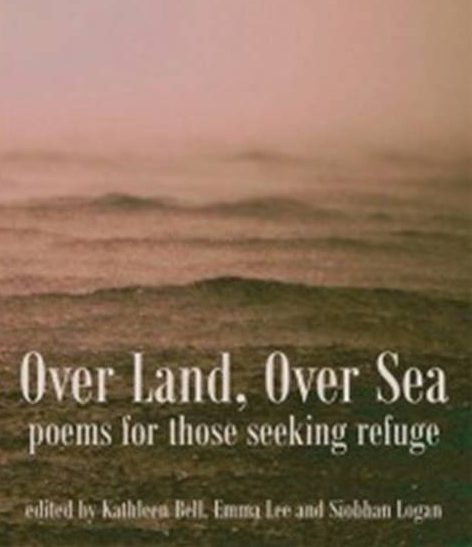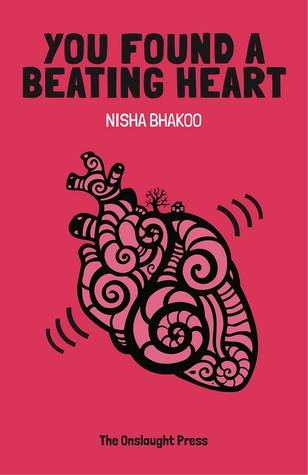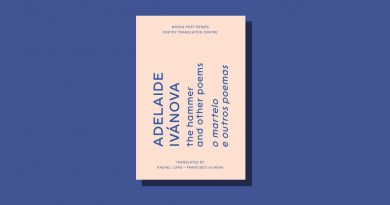Over Land, Over Sea: Poems for those seeking refuge ed. by Kathleen Bell, Emma Lee & Siobhan Logan
– Reviewed by Afric McGlinchey –
Over Land, Over Sea is a timely and generous publication (the proceeds from sales go towards a Refugee Forum and Médecins Sans Frontières), exploring what it means to lose your home and to be forced to flee a conflict that has obliterated the concept of living safely in the country of your birth. The contributors range from well-established poets to those at the start of their career, from migrants themselves to those who have campaigned or raised funds on their behalf. When poetry is written for a worthy social cause, there is a different, more focused, level of engagement with content. The anthology’s netting of such a disparate constellation of voices is part of its cumulative power.
Some poems communicate that vibrating force of fear which triggers the compulsion to flee, and remains buried in the body. It becomes a muscle memory, waking at night, stirring old fears in the stomach and pumping them to the heart: ‘jittery and wired to the scroll of scouring jets…’ (Roy Marshall, ‘Hayride’) ‘The smell is of sweat and fear and no sign of a toilet.’ (Joan Byrne ‘In truth I was afraid’); ‘clutching their hands on their hearts’ (Andy N, ‘Breathing from a Permanent Home’); ‘He wakes on the floor of his room…sweat…on his brow’ (Chrissie Gittins, ‘No Further’).
This is why the word ‘refuge’ is so important: it represents both physical and psychological safety, a sense of peace. As Mahendra Solanki puts it: ‘we seek comfort in this pull of green’ (‘from The Riverside Commission’).
While uneven in terms of craft and poetic quality, the diversity of approaches and attitudes, of time frames and variations of migration, is exciting. A refugee runs ‘across continents / over rivers / through forests / through deserts / and through tunnels’, prompting, not the expected compassion or fear, but inspiration, for Ambrose Musiyiwa. Kerry Featherstone inhabits the voice of a mother to prompt empathy, but also hints at darkness: ‘Here is my son, Aymal, /who must keep bloody secrets.’ Sally Jack acknowledges individual refugees by name: ‘Tarek’s false leg gives him pain but Tomas offers a ride on his bicycle. //Amira’s feet are bleeding, Sayid gives her his trainers.’
Truths are told of an inadequate official response to the crisis. Peter Wyton highlights the bitter irony of authorities belatedly naming an abandoned newborn: ‘There is a procession in his honour. …Callum …is in his rightful place, at the forefront of the whole assembly, carried by a single undertaker.’ (‘Callum’s Day’)
Gregory Woods marks moments of a refugee’s life in twelve stark and poignant tercets:
He takes to languages
like landscapes: in each
a job, a girl, a question.(‘Life History’)
Other poets approach the situation from the point of view of the receiving country. Ken Evans points out that if someone starts a sentence with ‘I’m not racist but…’ the only response is to ‘turn and refuse to accept that caveat.’ (‘Citizens’) Lydia Towsey apologises for those who are unwelcoming to the refugees, with a razor-sharp reminder of sins of the past:
Slip your shoes off,
take this blanket
it’s the least that we can do.I am sorry for our manners,
when we visited you last
the mess we left(‘Come In’)
Several poems refer to the photograph of Aylan Kurdi:
I just wanted you to know
your lovely bones have not been wasted
writes Laura Taylor poignantly in ‘Aylan’. Danielle Hope’s ‘Exodus’ lists the names of vessels and ends with the evocative line ‘Empty shoes carpet the sea.’
In a more slant approach, Chrissie Gittins describes jars of Elsinore strawberries, which hang ‘in their syrup / like air balloons in a red sky’, confiscated from her rucksack at the airport:
I hadn’t lost my clothes, I hadn’t lost
my childhood in photographs,
I hadn’t lost my country.
And still it cuts me to the quick.(‘Frontiers’)
I relate to the concrete and individual, rather than the abstract, amorphous multitude. Reading personal narratives gives a jolt of recognition and connection. Sally Flint’s ‘We Arrive By Truck’ contains many vivid images that will pierce mothers in particular: ‘That’s not kohl around her eyes; it’s dark tracks of sleeplessness’; and ‘She knows she should give her infant water, /but the orphan children who drank /from the river all disappeared.’
The most interesting poems approach the current refugee crisis from an alternative or lateral viewpoint. Rory Waterman uses juxtaposition and perspective to startling effect: ‘…on the verge of silence. / A butterfly bounced across. A plane hit a mountain / but slid out the other side like a threaded needle.’ (‘Ave Maria’) The bright, singular quality of these paired images, that endorphin-like impact, which strikes like a happy blow on the head, makes us believe the simile is simple, but like the best moments in poetry, it exceeds logic.
Another poet who layers images interestingly is Ammar Bin Hatim, war ‘exhibiting its ugly boobs like disfigured whore.’ He addresses the virtual Norman:
‘We are very similar my friend
we both put a red novel and a grenade in our khaki bag,
we both can’t look at dead cats and we are asked to Fight!
Have you heard, Norman?
The crash of ribs under that crazy tank!!(‘Me and War’)
In Jasmine Heydari’s powerful poem, ‘The first time…mother decorated the windows of our rooms with / a duck-tape in the shape of the letter X /was the day of my fifth birthday’. Later, the first word she writes beginning with W is ‘war’ (‘The First Time’).
There are some poems that make effective use of form. Rod Duncan’s ‘but one country’ dramatically uses the speculum form to subvert the viewpoint offered in the first stanza. Daniel O’Donnell-Smith also plays with variations of a single sentence to present disconcerting conclusions. (‘and the sea did give up those dead in it’). David Belbin’s redacted poem, ‘From a North Atlantic Island’ uncomfortably communicates both resistance and a hesitant guilt.
Marilyn Ricci compares the current refugee plight with the Irish exodus after the famine: ‘uncle Mick and aunty Mary …bawling out the songs in the Emerald Club, though they wouldn’t go back, not now.’ Mariya Pervez reminds us of the first white lab mouse to be sent to the moon, that ‘Died in the rocket, a pocket-sized / Martyr to the cause of discovery’ (‘The Whiteness’). Also venturing space-wards, George Symonds considers future migration: ‘they’re coming over here, and taking our space/say the stars, the planets/the moons and supernovas’. Siobhan Logan, on the other hand, harks back, to the very first nomads, driven on by ‘scouring hunger’ and ‘desert winds’ who found themselves at the shore of the great water, the point from which, we are told in a footnote, our earliest human ancestors embarked to leave Africa:
When a sharp-eyed hunter spied land over there
we began to think
how to reach this new place, how to put
ourselves into the water.
(‘The Gate of Grief’, or Bab-al-Mandab, Red Sea)
This same apprehension is conveyed in Rose Scooler’s poem, translated by Sibyl Ruth, which rings with a heart-wrenching authenticity:
Almost we’d begun to feel that life in the camp was safe.
Now the way ahead’s unclear…nobody knows what’s going on outside;
where our families are, if loved ones have been spared.
We have become weak. The very thought of being told
our future makes us tremble. We are that scared.(‘Goodbye to Theresienstadt’)
What marks the anthology for the most part, is a relational vibration, a sense of community, rather than a differentiated ‘they’ or ‘we’. Through an assembly of voices and pluralities of experience, resonances are triggered: above all, this anthology is about connection. Tania Hershman uses the theory of relativity to show how:
we are all bound I nudge space
you
are shifted(‘Relativity)
I hope Over Land, Over Sea gains a wide readership, and achieves just that.




